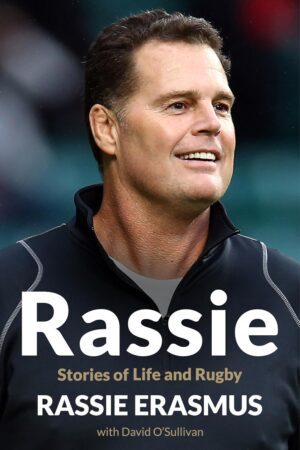As a lifelong rugby fan married into an Afrikaans family, I approached Rassie: Stories of Life and Rugby with both curiosity and personal interest. Johan “Rassie” Erasmus is a figure who transcends the sport. His journey from a small town in Despatch to becoming one of the most influential leaders in world rugby offers valuable lessons in leadership, resilience, and navigating transformation—both personal and societal. This autobiography is more than a recount of matches and strategies; it’s a window into the mindset of a man who has reshaped South African rugby in turbulent times.
A Journey from Despatch to Global Icon
In Rassie, Erasmus takes us through his rise from a young boy in Despatch to the mastermind behind the Springboks’ triumphant 2019 World Cup win. The book details his playing career, marred by 32 surgeries, and his transition to coaching, where he became known for his innovative and, at times, controversial methods. A highlight of the story is the pivotal moment when Erasmus named Siya Kolisi the first black Springbok captain—a landmark in South Africa’s post-apartheid rugby history.
What’s particularly compelling about the book is how it weaves together the personal and political. Set against the backdrop of South Africa’s ongoing transformation, Rassie explores how his upbringing during apartheid and his experiences in post-apartheid South Africa shaped not only his worldview but also his leadership style. Erasmus presents himself as a man who thrives on pushing boundaries, often testing the limits of convention to inspire both his players and his country.
Leadership Through a “Siege Mentality”
One of the most fascinating, though sometimes polarising, elements of Erasmus’ leadership style is his cultivation of what can only be described as a “siege mentality.” Throughout the book, Erasmus frames himself and the Springboks as underdogs fighting against external forces, whether referees, the rugby establishment, or media critics. This mindset came to a head during the 2021 British & Irish Lions tour, when Erasmus released a 62-minute video criticising refereeing decisions—a moment that sparked considerable controversy.
In his account, Erasmus portrays this event as a fight for fairness, but the narrative at times feels one-sided. There’s little reflection on moments when the Springboks benefited from favourable decisions, which detracts from the book’s balance. While this “us vs. them” mentality has undoubtedly galvanised his team, it also highlights a somewhat narrow perspective on the broader rugby world. A more reflective approach that acknowledged both the highs and the lows—both the times the Springboks were disadvantaged and the moments when fortune was on their side—would have added depth to the story.
However, this mentality is not entirely surprising. As an Afrikaner raised in the politically charged era of apartheid’s fall, Erasmus was part of a community that often felt isolated and embattled. His leadership style mirrors this—by instilling a sense of collective adversity, he forges a powerful internal bond within his team. The question remains: is this a genuine reflection of Erasmus’ worldview, or is it a tactical move to motivate his players? The answer likely lies somewhere in between.
That said, Erasmus does provide valuable lessons for leaders in any field. His relentless focus on transparency and communication with his players, for example, offers a timeless reminder that trust is the foundation of strong leadership. Despite his grievances, Erasmus is an advocate for honesty, insisting that open dialogue is the key to avoiding misinformation and keeping a team unified.
Broader Leadership Lessons
As Erasmus won the 2019 World Cup at the same age I am now, I couldn’t help but reflect on what sets him apart as a leader and what lessons I could take into my own career. Beyond his technical mastery of the game, Erasmus’ approach offers several key insights into leadership:
- Resilience in Adversity: Erasmus’ story is a testament to the power of resilience. His journey through apartheid-era South Africa, his battle with injuries, and his later innovations in coaching demonstrate that adversity can be a powerful catalyst for growth.
- Courage to Innovate: Erasmus isn’t afraid to challenge the status quo. Whether it’s his use of software to analyze play or his decision to make Siya Kolisi captain, Erasmus shows that true leaders must sometimes break with tradition to achieve greatness.
- Conviction in Leadership: Despite the controversies, Erasmus stands firm in his decisions. This conviction, while not always popular, has been a cornerstone of his success. Leaders who stand by their principles, even when faced with external pressure, often inspire the greatest loyalty.
- Driving Societal Change: Perhaps the most poignant aspect of Erasmus’ leadership is his role in guiding a racially transformed Springbok team. By making Kolisi captain, Erasmus used his platform to advocate for a more inclusive and united South Africa. Leadership isn’t just about winning; it’s about using your position to drive meaningful change.
Final Thoughts
Rassie: Stories of Life and Rugby is a compelling reflection on leadership, resilience, and the complexities of post-apartheid South Africa. While it occasionally falls into the trap of focusing too much on grievances, the book offers valuable insights into the mindset of one of rugby’s most influential figures. For fans of the sport and those interested in leadership, it’s a fascinating read.
If you’re looking for a story that delves into what it means to lead under pressure, adapt to societal transformation, and innovate in a traditionally rigid field, Rassie is well worth your time. And with the story ending just before South Africa’s 2023 World Cup victory, I can imagine Rassie has already started work on the sequel.
